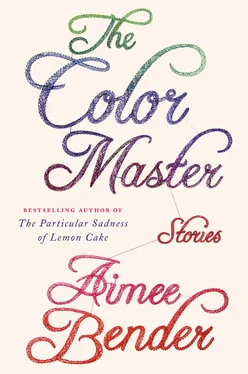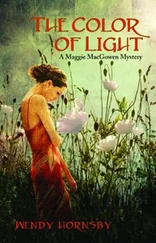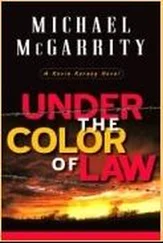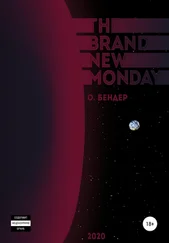“Enjoy,” he said, handing over the straw.
It was okay lemonade. Not delicious, but not bad. Still, meeting him and drinking it gave me enough of a lift that I could get myself to the elevator in front of Victoria’s Secret which was having a big sale on pink bras that said PRETTY over the boobs, PRE on one boob, TTY on the other.
When I was out of eyeshot, I tossed the lemonade.
I took the elevator to P3, which was the right level, and then my car was in G2, which was green, and which I had remembered by thinking GIRL, I am a GIRL, and the 2 was for TWO GIRLS: Louanne and Sylvia, going to the mall.
“G2,” I’d told Sylvia, pointing it out, explaining, as we got out of the car. “You and me,” I said.
She’d shaken her head and laughed. “You are so weird, Louanne,” she said, but she didn’t shake me off when I linked my arm with hers.
G1, going home.
At the bottom, I paid my parking dollar and said gracias to the Mexican lady who worked the booth and I told her I liked her red earrings. She sort of stared past me with eyes that said there are more cars waiting, so I moved on ahead and made a right turn, out of the mall.
The people were all busy in their cars, listening to the radio, so there was no one to smile at, so I just sent my love to the traffic lights. No one ever appreciates them, all day long, working so hard to turn red and yellow and green, right in time with us to make sure we don’t crash into each other. If there was any tiny chance, even the tiniest chance, that they happened to be alive, I bet I was the first person ever to tell them they were special. You are special, I said out loud in my car, but in case they couldn’t hear, I cracked my window open. “You are special,” I said, to the night air.
And just like that, a green light.
And then it’s me and La Cienega, all the way home.
I met Arlene in college, in the freshman dorm. We were not roommates but suite-mates in the corner section of a squat brick house at the center of a small college campus in the middle of Ohio. We both had moved from opposite coasts with the desire for a personalized liberal-arts college experience and had become friends due to proximity and availability more than compatibility. For example, we had nothing in common. She: Blue Ridge Mountain town. Me: central California suburbs. She: declared international-relations major with three eclectic minors. Me: not yet totally decided. The men she liked were brutish jocks; I had located within two weeks every single soulful gentleman on campus who wrote poetry. I found them by the length of their hair or the wear of their jeans. She liked big-budget romantic movies; I saw every documentary I could find at the library, and if I’d had any retention ability, I would’ve stored a great deal of knowledge about the world. She had a perpetual perm, because she felt it added volume to the thinness of her hair and gave her a look of energy; I was hard-pressed to use a brush because I preferred a ponytail, and part of trying to attract those poet-men was to look a little like I had wandered onto campus by accident after having spent ten years with the wolves behind some farmhouse, living off scraps and reveling in the pure air like a half–girl Mowgli, half–woman Thoreau.
Unfortunately for me, she seemed to get a lot more sex than I did. The brutish jocks were hell-bent on getting her into bed, perm and all, and half of the poets—who were not really poets but just had volumes of very nice leather-bound, nearly blank poetry books given to them by parents who were trying to be supportive, books partially filled with the same poem, over and over, called “Life” and/or “Life II” and/or “Why Love Is an Illusion”—these men didn’t always want to touch a woman, or a man, but, rather, mostly themselves. It took me until senior year to find a poet who actually wrote poetry, and he took off my clothes very gently and spent nearly an hour on my neck and back, and when we were done and I felt all my waiting had been worth it, he explained that part of his education as a poet was to meet as many women as possible, and so this was now to be goodbye. He suggested I pretend he was going off to war on a boat. “What boat?” I said, clutching the blanket. “We live in Ohio.” He left a leaflet on my bed torn from a three-ring binder. Your breasts are fortune cookies, full of small wisdoms , he wrote. I read it multiple times. I almost notified the English Department. I was very tempted to show Arlene, but she was busily documenting her outings and weekends in a photo album labeled College, Senior Year , and although she had never been anything but sympathetic about my history with men, I couldn’t bear the thought that she might laugh at me and not him.
One afternoon in late March of our senior year, just about two months before graduation, I wandered into the apartment I then shared with Arlene and found her standing at the fridge looking upset. She was rummaging around in the vegetable drawer, and her mascara was smudged. Mascara, like the perm, was part of her daily wear.
“What is it?” I said. “Is it Fred?” Fred was her latest jock, a wide-eyed, hurdle-jumping track star whom I found very attractive and who stoked my envy. I always harbored a secret hope that they’d break up.
“No,” she said, into the shelves. “Fred’s fine.”
“And?”
“I don’t know,” she said. “The usual.”
She held up several thin plastic bags holding vegetables we’d bought and forgotten to eat: floppy green onions, a browning head of broccoli, limp kale.
“We never ate any of this,” she said.
“So throw it out,” I said.
She dragged a hand across her eyes. “This happens every time,” she said, shutting the fridge door. “Why do we even bother to go shopping?” She pulled on a coat and went outside with a shovel, picking and digging at the ground until she was able to bury the old vegetables under a bedraggled marigold plant. I watched from the window. She was often upset in these days, usually about graduating. Every night, she cried a little about the end of this phase of her life. What the changes would be like. How much she would miss me, and her classes, and our apartment. I would watch her cry sometimes, on the sofa with her tissue, and I’d say comforting things I’d heard other people say about the opening and closing of windows and doors, but mostly I just admired how she did it; she had this way of crying like she didn’t realize she was crying.
When she came back inside, she was gripping a yogurt cup someone had thrown near our side strip of garden.
“Plastic doesn’t cycle.” She shrugged off her coat. “Right? We recycle it, but it can’t do anything on its own, and all it can ever do is be itself again. It is the worst kind of reincarnation. Lame! That is so lame! And it’s everywhere !” she cried, going to the bathroom to splash water on her face.
Arlene didn’t usually get so worked up about things like the veggies or the yogurt cup, but her moods had been heightened in the weeks since our friend Hank had hit the doctor on his drive to the recycling plant. Hank was a nice guy who lived two apartments over with a mutt named Blooper, and the two of them came by often. Hank, like Arlene, was conscientious to a fault. In fact, he was so thorough that he did not trust that the big blue trucks would actually take his recycling to the plant, so once a week he drove it over himself. He crushed his bottles and folded up his boxes, and he said he found it very comforting to see the plant itself, those manmade cycles in action. “It’s called a plant !” he’d say, goofily, delighted. Had he not been gay, I’m sure he and Arlene would have fallen very deeply in love for a long time.
Читать дальше












